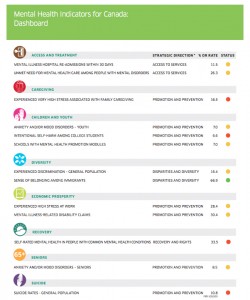The Mental Health Commission of Canada (MHCC) has just released the first phase of its project, Informing the Future: Mental Health Indicators for Canada, to identify a first-ever set of national mental health indicators. This first report provides details on the first 13 of 63 indicators involving children, youth, adults and seniors in a variety of setting. The report found that 17 percent of Canadians caring for chronically ill family members are experiencing “very high” levels of stress. This problem is anticipated to get worse as the population ages and rates of dementia and other chronic illnesses increase. This is why caregiving is among four of 13 mental-health indicators deemed areas of “significant concern” by the commission. Other areas of significant concern include suicide rates, intentional self-harm among college students and mental health recovery.
 This initiative stems from the MHCC’s 2012 Mental Health Strategy, which identified the need for a comprehensive set of indicators. This set of national indicators will allow provinces to measure their progress in transforming the mental health system and improving outcomes over time. Many individuals are praising the report including the president of the Canadian Medical Association, Chris Simpson.
This initiative stems from the MHCC’s 2012 Mental Health Strategy, which identified the need for a comprehensive set of indicators. This set of national indicators will allow provinces to measure their progress in transforming the mental health system and improving outcomes over time. Many individuals are praising the report including the president of the Canadian Medical Association, Chris Simpson.
“The use of health indicators for mental health surveillance has been critically lacking,” he said in a statement.
The first 13 indicators focus on subjects outlined in MHCC’s Mental Health Strategy and were selected to represent a broad range of mental health related issues in Canada (see the image in the side bar). The indicators have been colour-coded to reflect how Canada is performing (e.g. green = good performance; yellow = some concerns; red = significant concerns).
The MHCC project was a partnership with Simon Fraser University’s Centre for Applied Research in Mental Health and Addiction under the leadership of Dr. Elliot Goldner, the Canadian Institute for Health Information and the Public Health Agency of Canada.
The preliminary report can be downloaded on MHCC’s website.
For more information, visit the MHCC website.